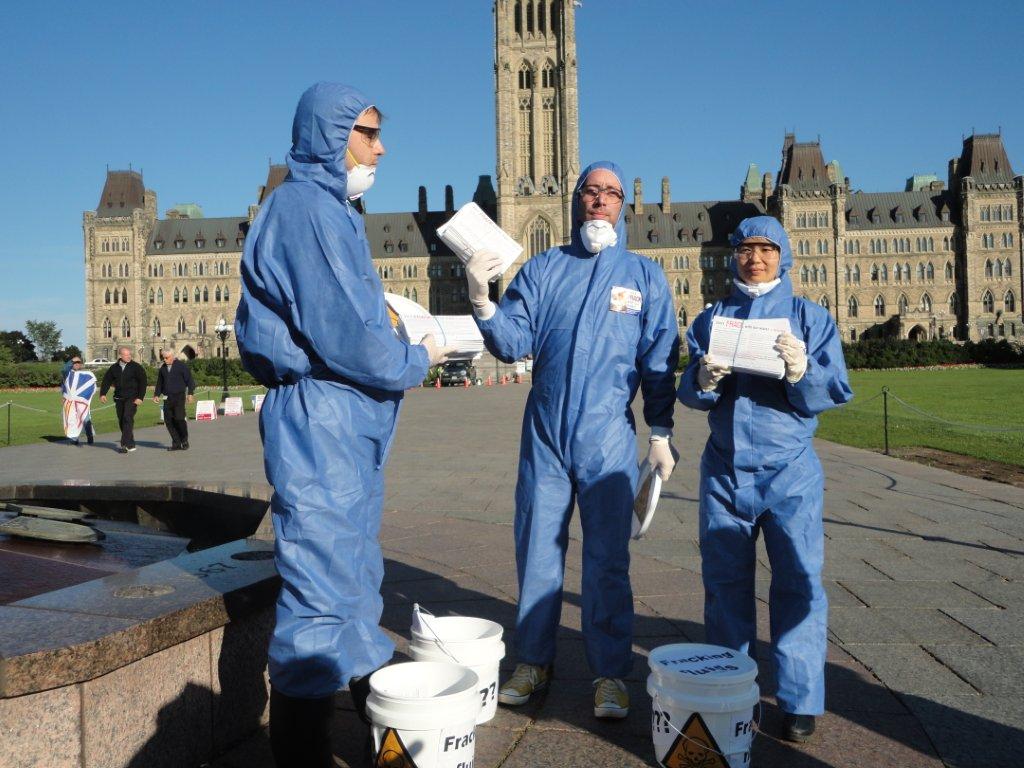Council of Canadians staff delivered petitions yesterday signed by nearly 10,000 people who are demanding a moratorium on hydraulic fracturing in Canada until the federal reviews are complete.
Organizing Team Administrative Assistant Philippe Charbonneau, Communications Officer Matthew Ramsden and I dressed in hazardous materials suits and attempted to deliver mock buckets of toxic fracking fluids to Environment Minister Peter Kent. The buckets, filled with petitions, highlight the concerns people have about fracking fluids such as the potential for water contamination by fracking fluids, the lack of disclosure of fracking chemicals and the lack of a solution to dispose of fracking wastewater.
Hydraulic fracturing, more commonly known as “fracking,” is a technique to extract natural gas from harder to access unconventional sources trapped in rock formations such as shale gas, coal bed methane and tight gas. Millions of litres of water and thousands of litres of chemicals are injected underground at very high pressure in order to create fractures in the rock allowing gas to flow up the well.
We invited Peter Kent along with MPs from all parties. While Peter Kent failed to appear to accept the petitions, NDP Deputy Leader and Environment Critic Megan Leslie accepted them and will table them in the coming days. To read more about the delivery and view other photos, click here. To view a clip from CTV News on the action, click here.
The delivery leads up to the Global Frackdown, a day of action taking place around the world tomorrow. There are over 150 events organized in over 20 countries around the world calling for ban on fracking.
In Canada, First Nations and communities have repeatedly been raising red flags on fracking for a number of reasons. Fracking uses a massive amount of water. It has been estimated that 7.5 to 19 million litres of water is used per fracking job. Communities oppose fracking because of the potential for water contamination. A recent scientific study published in international journal Risk Analysis found that current methods of fracking wastewater disposal is putting drinking water at risk. There are also established links between fracking and earthquakes. Earlier this month, the B.C. Oil and Gas Commission concluded that earthquakes in the Horn River Basin were caused by injection of fracking wastewater into the ground.
Communities are concerned with the health risks associated with fracking chemicals. There are estimates that a typical fracked well uses anywhere from 55,000 to 220,000 litres of chemicals. Gas companies are not legally required to disclose the name of chemicals used in the fracking process. Studies conducted in the U.S. have found that some are known carcinogens and others are linked to respiratory illnesses and have negative impacts on neurological, reproductive and endocrine systems.
An Environics poll conducted earlier this year found that the majority (62 per cent) of Canadians want a moratorium on fracking until the federal reviews are complete.
We hope the federal government will listen to the demands outlined in the petition and place a moratorium on fracking until the federal reviews are completed. With cuts to pensions and other critical public services, the gutting and repeal of environmental legislation and the planned closure of the world-renowned Experimental Lakes Area, the Harper government is stepping farther and farther away from what communities and First Nations value in Canada. Fracking is an example of how the Harper government is pursuing economic and resource development to the detriment of other priorities such as public health, environmental protection, democratic debate and transparency. Minister Kent has admitted he has the power to stop fracking. We urge the federal government to ban, or at the very least, place a moratorium on fracking in order to begin to realign themselves with what the majority of people in Canada want.



